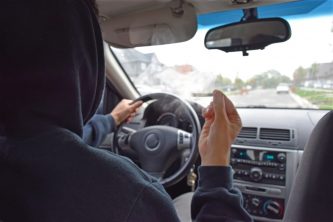Most people understand that stealing another person’s vehicle is a crime. The same holds true in California. However, some people may not know that you may be charged with a crime if you borrow another person’s car without their permission.
The California law known as Vehicle Code 10851 is referred to as the state’s joyriding law. According to this law, if convicted, a person can face up to three years in prison or be charged with a felony for taking or driving another person’s vehicle without permission.
What Is Joyriding Under California Law?
Joyriding differs from grand theft auto because those who obtain these vehicles do not intend to keep them. They want to drive them around for a while and then abandon them. However, because joyriders tend to drive recklessly, they can potentially endanger the lives of others. Reckless driving can result in more severe penalties, which is why a California joyriding defense attorney can help those arrested for these crimes.
Joyriding sounds like a fun and harmless term, but California courts treat this law seriously. According to state law, joyriding is when a person takes or drives someone’s vehicle without first receiving their permission to do so.
It is essential to realize that it does not matter how long the person accused of joyriding has another individual’s vehicle. Whether they have it for one minute or one hour, it can be considered joyriding if they obtain the vehicle without the consent of its owner.
What Are Examples of Joyriding?
One might assume that taking or driving another’s vehicle can only happen if one person has illegal thoughts in mind. But sometimes, the intent is not to break the law. Regardless of a person’s intentions, if they confiscate a vehicle without the consent of the owner, they are committing an illegal act. Let us look at some examples that might be interpreted as harmless.
Ted is staying at his friend Mary’s house. She took the train to her destination and chose to leave her car at home. Is it illegal for Ted to grab her keys and drive Mary’s car to the store to pick up some items? It is if he does not ask her first and get her permission.
Here’s another example. Frank rings his neighbor’s doorbell to ask them for a ride to the stadium to see the football game. They do not answer the door, but he notices that their car keys are in their truck. Is Frank breaking the law if he jumps in and drives the truck to the game?
Yes. It does not matter if Frank is best friends with his neighbor. If he does not ask for permission to borrow their car, they are within their rights to call the police and have him arrested for breaking the law.
What Are the Penalties for Driving or Taking a Vehicle without Someone’s Consent?
In California, joyriding can be charged as a misdemeanor or felony, depending on the facts of the case and the person’s criminal history. For example, if this is a person’s first offense, a judge may be more lenient than if this is one of many offenses within a short period of time.
If a person is charged with a misdemeanor for joyriding, they could be in jail for up to one year and face a fine of up to $5,000. For those charged with a felony for joyriding, there may be additional fines or time in prison. The additional prison time can range between 16 months and three years, significantly more than if the crime was charged as a misdemeanor.
Someone with prior convictions could face more severe penalties. These include up to $10,000 in fines or up to four years in prison. Working closely with an attorney can help ensure that the penalties are as minimal as possible given the circumstances of someone’s unique situation.
How Can I Defend Myself Against California Vehicle Code 10851 Charges?
For a prosecutor to successfully convict a defendant, they need to prove that the person charged with joyriding took a vehicle that they did not own, that they did so without the consent of the vehicle’s owner, and that they did so to deny the vehicle’s owner possession of the car for the time they had it in their possession. Therefore, a California joyriding defense lawyer will do everything in their power to disprove one or more of these requirements.
What kind of defense strategies can be employed to achieve this goal? Let us take a look at a few.
A California joyriding defense lawyer might claim that the defendant legally owned the car or that permission was granted. The attorney might also argue that there was no intent on the defendant’s part to deprive the owner of access to the vehicle, that the car was taken under threat of injury, or that there was simply a misunderstanding. A skilled attorney who has experience in cases such as this will have numerous ways to achieve a desirable outcome for their client.
Why Should I Hire a Joyriding Defense Lawyer in California?
When faced with a joyriding charge, a competent defense attorney who is intimately familiar with CA Vehicle Code 10851 is needed. Driving or taking a vehicle without consent does not have to lead to the worst-case scenario. Often, the person who is arrested for joyriding is unaware of the options before them.
Working with a joyriding defense lawyer in California can tilt the scales of justice in your favor. Contact us today so one of our attorneys can help.







